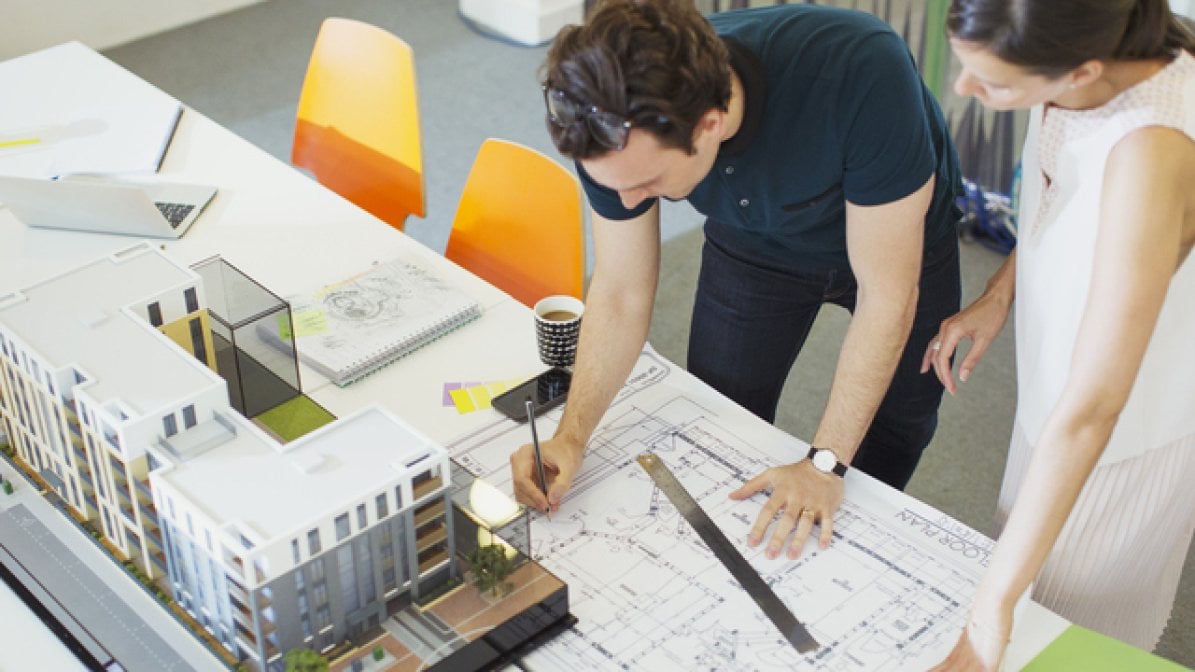If you choose an architecture or planning degree or apprenticeship, you’ll plan, design, and oversee the development and construction of the buildings or public spaces we live in. You’ll learn to combine innovative ideas with practical requirements, using the latest design technology to curate and share your ideas.
As a popular subject to study, jobs are expected to grow by 1.33% over the next eight years, with many routes to choose from and plenty of jobs on offer outside of becoming an architect, thanks to a wealth of transferable skills. After studying, you could choose to work as an architect, architectural technologist or technician, planning officer or surveyor, among other roles.
The impact you could make
- Shape cities of the future, regenerate urban areas, or design eco-friendly buildings or towns.
- Push for new ways of doing things, like making buildings or the industry more sustainable.
- Bring innovative design into everyday life, impacting people’s day-to-day experience of the environment around them.
What you could study
- History and theory of architecture
- Building structures and construction
- Design and design communication
- Architecture and the built environment
- Technology and digital built environment
- Graphical and modelling techniques
- Urban, town or regional planning
- Landscape architecture
Chat to a current architecture and planning student
Chat to a current architecture and planning student using UniBuddy.
Some conversation starters for you:
- Ask which modules they really enjoyed.
- Find out how easy it was for them to make friends on their course.
- Do they have any tips on your personal statement?
- Did they do anything to prep for uni before they went?
- Are there books, podcasts or YouTube channels they would recommend?
Example module
Example project
90% of students
Higher Technical Qualifications
Higher Technical Qualifications
Higher Technical Qualifications (HTQs) are an alternative to apprenticeships or degrees.
They have been specifically designed with employers to ensure learners get the skills that employers have said they need. They are a quicker and cheaper alternative to a degree and can lead to higher wages early in a career.
Subjects it's useful to have studied first
Some architecture and planning courses or apprenticeships will have requirements for previous qualifications in certain subjects. You may also need to present a portfolio of work. Entry requirements vary, so always check with the provider.Maths
Geography
Design technology
Art
Science
Engineering
Hard skills you'll develop
- 3D modelling software
- Agile methodology
- Building codes and laws
- Project management
Soft skills you'll develop
- Communications
- Planning
- Leadership
- Presentations
- Innovation
Careers: Where it can take you
Find out more about your career prospects from studying architecture and planning. The following information is based on a typical architecture professional role.
Average salary
Available jobs
Career options
Architecture and design

What is a… conservation architect?
You may think a conservation architect has something to do with protecting the environment, and it does, but more our historic environment. A conservation architect has specialist knowledge and experience of working with historic buildings. Ever wondered who might be responsible for renovation plans at, for example, Notre Dame cathedral in Paris after it was partially destroyed by fire? That's right, a conservation architect will assess a building’s stability and adherence to safety regulations before setting about designing and restoring the building, in keeping with its original design.
Find your ideal career
Take our careers quiz to find your ideal job matched to your personality type.Getting in: Entry requirements
Find out more about what you'll need to study architecture and planning at university or as an apprenticeship.
Average requirements for undergraduate degrees
Entry requirements differ between university and course, but this should give you a guide to what is usually expected from architecture applicants.
A levels
Scottish Highers
T Level
Vocational

Architecture and planning apprenticeships
Check out our industry guide to help you decide if an apprenticeship might be the right choice for you.As an architect, you will change the world. Architects combine their creativity with knowledge of technology, history, theory, and professional processes to design spaces and places for people. Working directly to address the climate emergency, ensuring that building users are kept safe and healthy, and addressing physical, economic, and social concerns of communities are all part of the role of the architect. The industry is changing, and it is an ever-challenging and interesting place to be. It makes a difference to people’s lives.
Other subjects you may be interested in
Considering an apprenticeship?
Applying for an apprenticeship is just like applying for a normal job. Here’s what you need to know:
-
1
Deadline
Apprenticeships don't follow the same deadlines as applying to uni, the deadline is down to the employer. -
2
Where to apply
You apply directly through the employer. -
3
No limits
You're not restricted to one apprenticeship application; you can do as many as you like.
-
4
Apply to university and apprenticeships
There's nothing stopping you applying to university through UCAS, while also applying for apprenticeship vacancies. -
5
Find out more

Apprenticeship vacancies
Check out live apprenticeship vacancies in construction, architecture and the built environment.Explore further
Go deeper into topics around architecture and planning with the following.-
1
RIBA Architecture on YouTube
Follow RIBA for competitions like House of the Year, hear discussions around things like disability in architecture education, and find out about other relevant exhibitions and culture. -
2
The Planner
The Planner online magazine includes articles on things like redressing gender imbalance in public spaces, and how to design urban areas to cope with high temperatures. -
3
Instagram
Follow architectanddesign to see some of the most innovative new buildings globally, or follow the accounts of architects you admire.
Application advice
Whether it's personal statement tips or what to write in a cover letter for an apprenticeship application, our application advice will help you get ahead in your architecture and planning journey.
Label
Skills, experiences and interests to mention
Skills, experiences, and interests to mention
- Really think about why you want to study architecture or planning. Can you articulate what interests you about the subject, and what you hope to do with it afterwards?
- Do you have any particular hobbies or interests that draw you to this subject? Maybe you’re passionate about sustainability and want to ensure future buildings and urban areas work with our environment? Or maybe you love art and design and want to use those skills to create beautiful and practical spaces?
- Demonstrate you know a bit about the industry. Mention what you've been reading, or critique a building or architect you admire. What is it you like about that building or person? How would you evaluate their work?
- What subjects have you enjoyed at school, and how do they feed into your interest in architecture or planning? Maybe you did a project in DT that has inspired you or a geography field trip changed how you feel about our built environment?
- What about your softer skills? What have you learned through part-time jobs or work experience that may be relevant? Consider technical skills but also the ability to work well independently and as a team or your ability to take on a project and see it through to completion.
















